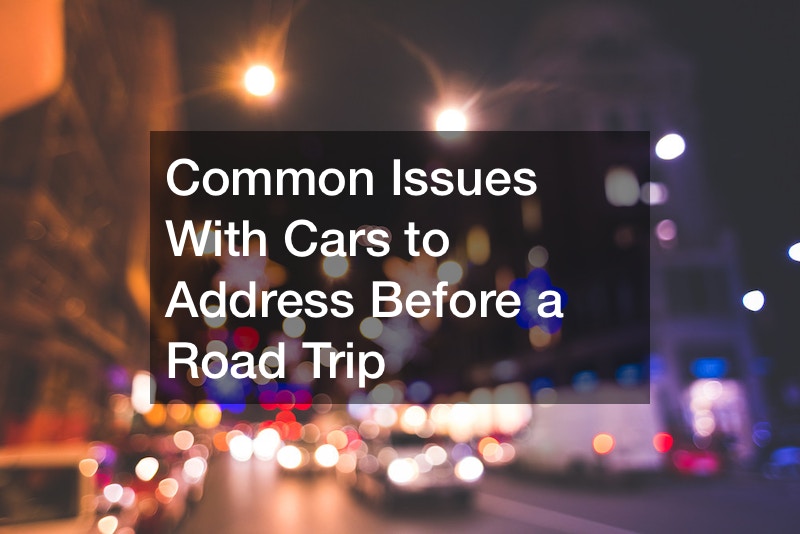
So you’re planning a road trip? You’re about to have one of the best adventures of your life. Whether you’re going with friends or family or want to use the opportunity to spend some quality alone time, being out on the open road is a great way of taking a break from the ever-busy life of the city. However, if there’s one thing that can cut your fun short, it’s experiencing car troubles. Address these common issues with cars before hitting the road so the fun never stops.
1. Clean Up
The last thing you want on your road trip is to be in a filthy car filled with a foul smell, especially when the weather gets hot. So, as you prepare for your adventure, thoroughly clean your ride. Pay special attention to the areas you constantly touch, including the dashboard controls, storage areas, floor mats, cupholders, and seats. Don’t let yourself be in a situation where you unintentionally dump your Big Gulp in your lap because the grime at the bottom of the cupholder stuck to it.
You also want to clean your trunk so your luggage or any souvenirs you pick up on your route along the road don’t get damaged. Remember to give the outside a thorough wash before you set out. You’ll be encountering a lot of bird poop and bugs on the open road, and they’re common culprits for eating paint.
One benefit of cleaning your car before your road trip that may not be apparent is that it’ll make it easier to identify common issues with cars. When there are layers of dust or mud on your automobile, you may miss the telltale signs of developing problems that need your attention. Some of them can cause breakdowns when you’re having the most fun. Don’t underestimate this seemingly minor task.
Understandably, you may not be the biggest fan of washing your car; few people are. The good news is you can always take it to your local carwash. There, you’ll find different packages designed for different needs. If you want a comprehensive cleaning job, request a car detailing service.
2. Faulty Spark Plugs
Most people know what spark plugs are, what they do, and their role in ensuring the car’s smooth operation. However, not many think to check them regularly or when going on a road trip. It shouldn’t be the case for you, as misfiring spark plugs can result in common issues with cars, including malfunctioning engines and failing catalytic converters, which you don’t want to deal with during your road trip.
The problem with such issues is before you even think to inspect the spark plugs, you’ll likely have checked other parts of your car, suspecting they’re the source. You end up spending a lot of time diagnosing the car to get to the root problem, and once you do, the repairs can be costly. So, as a preventive measure, ask your mechanic to replace the spark plugs. This way, you can be sure that the possibility of you needing towing services will be reduced.
3. Leaks
Leaks are among the most common issues with cars. If you notice fluid pooling under your automobile, have a professional check it out immediately. If there’s an oil leak, your ride may overheat or suddenly come to a violent stop. A coolant leak can also cause overheating, in addition to burning oil.
Don’t even try driving the vehicle if you have a brake fluid leak. Your windshield washer fluid is the only one that can leak without directly putting you in danger. Still, even then, it can make driving in dusty conditions much more dangerous. Just to be safe, have your mechanic take a closer look at any leaking fluid before you set off.
4. Faulty Belts and Hoses
You may feel intimidated by the many components under your car’s hood. However, there are a few clear warning signs of common issues with cars that everyone can recognize, even the greenest car owner. To ensure that the belts are snug, press them down. You should feel very little slack.
If the belt features teeth, none should come loose when you apply a bit of pressure. If it skips teeth, don’t attempt to drive the car. While there, check for obvious fraying, cracking, or missing teeth, as they indicate you need to get a replacement. Don’t forget to inspect the hoses for fluid leaks, paying particular attention to the ends of each hose.
If a belt or hose fails while you’re behind the wheel, it can spell disaster for your engine. The worst part about this is that it won’t only leave you stranded in the middle of a road you don’t know well. You might also end up with a vehicle you can’t fix.
Such a situation can be a real nightmare. So, as soon as you notice any issues with the belts and hoses during your inspection efforts, have your local auto repair company address them. If you fail to do so, you may find yourself in a situation where you need the help of a 24 hour tow truck service.
5. Leaky or Flat Tires
A flat tire can ruin your road trip before it even starts. Some common issues with cars often result in flats after you’ve been on the road for an hour or two. In other cases, air leaks might occur for days or weeks before you notice them. This is especially true when tiny nails or glass fragments become lodged in your tread.
Underinflated tires, in the worst-case scenario, result in blowouts or, at best, poor gas mileage. In slippery situations, bald tires make navigation more difficult. It’s in your best interest to get all these tire problems looked at by a seasoned mechanic before you go on your road trip.
If the issues are minor and don’t put you in direct danger, they’ll likely recommend and perform quick repairs. However, if you’re dealing with extensive damage, they’ll suggest getting replacements. If this happens to be your case, consider getting aftermarket wheels, but consult your mechanic first to ensure you get the right fit.
One thing most drivers forget to check, and probably you too, is the spare tire. However, it’s just as important as the other tires on your car. Think about it. You find yourself in a situation where you have a flat tire, and just as you let out a sigh of relief, thinking your spare tire will save the day, you find that it doesn’t have enough pressure. It’s like being heartbroken twice on the same day.
6. Faulty Lights and Electrical Equipment
Faulty electrical systems are some of the most common issues with cars. Don’t take your ride off your parking lot without ensuring all exterior and interior lights work. Replace any burned-out bulbs as needed. If your wipers aren’t effectively clearing the windshield of water or are leaving streaks, now’s a good time to get a replacement.
According to Consumer Reports, getting a new pair every six months is good practice. Remember to check the air conditioner and horn, too. If your AC isn’t pushing out cold air as it once did, have a mechanic service it. This is especially important if you plan to head out for a road trip during warm weather.
7. Low Fluid Levels
Think of your car’s fluids as its lifeblood. There are six essential fluids, and their service intervals usually depend on mileage. As you get ready for your trip, consider the distance you’ve covered since the last service and how far you want to go for your road trip to determine what needs your attention most. If your calculations show that you’ll reach a service milestone soon, it would be best to take care of things now to avoid common issues with cars.
You don’t have to be an automotive specialist to understand the importance of oil for your engine. It’s responsible for lubricating moving parts to reduce the friction they experience when in action. Some of these parts include the camshaft, crankshaft, and pistons.
In the past, auto manufacturers recommended getting an oil change every 3,000 to 5,000 miles. However, there have been significant improvements in car technology since then, both under the hood and in your oil. According to Consumer Reports, several automakers now advise an oil change interval of every 7,500 to 10,000 miles. The good thing with this maintenance task is you don’t have to leave your home to get it done; you can schedule an oil delivery to your home.
Before establishing a regular oil change schedule, double-check your handbook. If the oil change was performed within the suggested time limit, use the dipstick to assess its condition and ensure it’s at the appropriate levels. If it’s below the minimum line or looks black and gritty, have a professional check it out immediately.
8. Worn-Out Brake Pads
Brake pads create the friction you need to slow down your car and get it to stop. Over time, they wear away and eventually become too thin to function effectively, one of the most common issues with cars. The good or bad thing is when this happens, you’ll be made aware by the irritating squealing or screeching noise they produce. In this case, getting replacements for the brake pads should eliminate the noise, and more importantly, you’ll be safer during your road trip. According to Popular Mechanics, your brake pads can serve you for 25,000 to 70,000 miles, depending on what they’re made of and your driving habits.
9. Missing Gas Cap
You probably witness this all the time. It’s surprisingly one of the most common issues with cars. A driver pulls out of the gas station with their gas cap sitting on the car’s roof or hanging loose. Sure, it may not seem like a big deal since there’s a gas tank door that stops anything from going into the tank.
However, the extent to which the gas cap reduces your gas mileage may surprise you. A missing gas cap will also let contaminants and moisture enter your tank, eventually damaging your engine. So, if you misplaced your gas cap or it has some damage, get a replacement before heading out for your road trip. This seemingly small action can save you a lot in the long run.
10. Windshield Cracks
Don’t dismiss any windshield cracks you notice, even if they seem insignificant. Minor cracks can quickly spread when the windshield is exposed to increased pressure. Even seemingly insignificant things like washing your car or experiencing a temperature shift might result in a build-up of pressure. If you only have a chip that’s less than a few inches, you can likely have it fixed by auto glass repair companies.
However, if a chip develops into a major crack, you may need to replace the windshield entirely, which is far more expensive than a simple fix. Remember that minor damage can spread fast, obstructing your view and creating dangerous driving conditions. Take care of any minor chips before they worsen and force you to get a replacement in the middle of your road trip. On the same point, if your windshield developed cracks due to a recent hail storm, take your car to a comprehensive auto hail repair service so they can address every issue.
11. Take Care of the Audio System
When people think of road trips, great music is often one of the first things that come to mind. Nothing can make a road trip fun like listening to a playlist of your favorite jams while cruising down the open road. So, as you prepare for your adventure, spend some time inspecting and testing the car audio system to ensure it’s ready to keep you entertained while driving.
If there’s some static or distortion in the sound, check for any loose connections between the components. While doing this, note that the audio quality of the files you play could be to blame. Low-quality files will sound tinny or distorted, even if you have the best audio system. Only use high-quality files if you’re serious about your sound quality.
Repairs and maintenance are probably the last thing you want to do when preparing for your road trip; it’s understandable. However, addressing them now can save you a lot of trouble. Take action before your car breaks down when you’re in the middle of nowhere with no help. Plus, taking care of common issues with cars before the trip will come in handy if you need to file an auto insurance claim.







